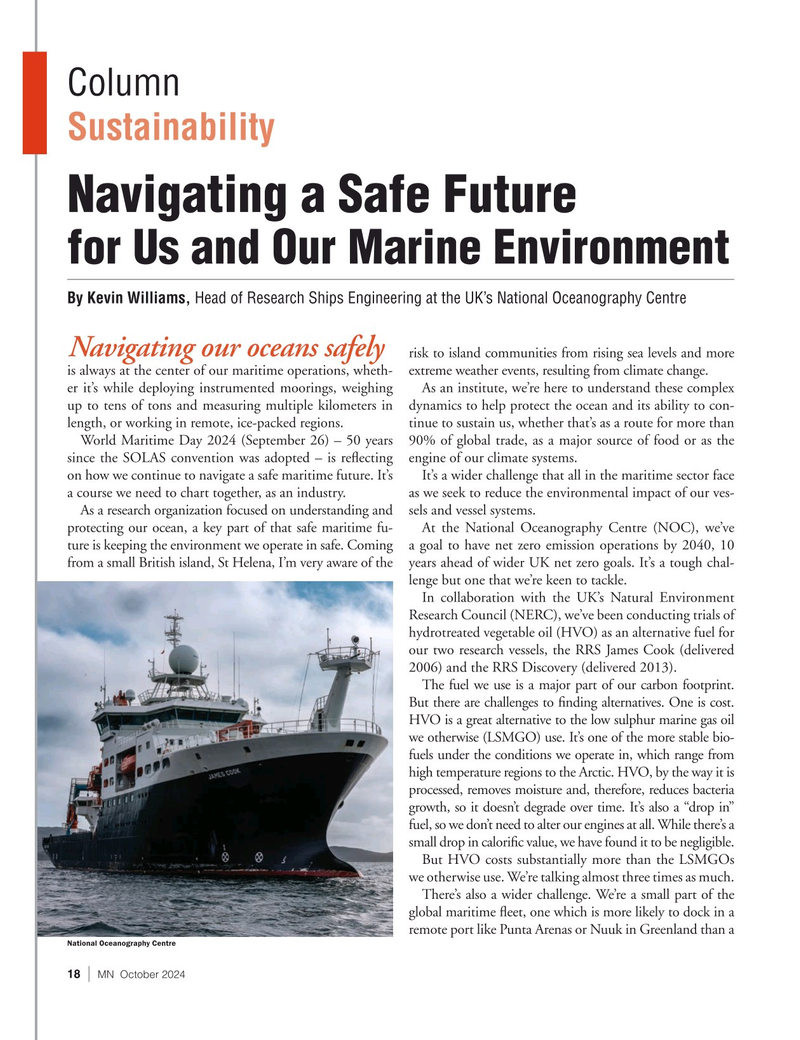
Page 18: of Marine News Magazine (October 2024)
Read this page in Pdf, Flash or Html5 edition of October 2024 Marine News Magazine
Column
Sustainability
Navigating a Safe Future for Us and Our Marine Environment
By Kevin Williams, Head of Research Ships Engineering at the UK’s National Oceanography Centre
Navigating our oceans safely risk to island communities from rising sea levels and more is always at the center of our maritime operations, wheth- extreme weather events, resulting from climate change.
er it’s while deploying instrumented moorings, weighing As an institute, we’re here to understand these complex up to tens of tons and measuring multiple kilometers in dynamics to help protect the ocean and its ability to con- length, or working in remote, ice-packed regions. tinue to sustain us, whether that’s as a route for more than
World Maritime Day 2024 (September 26) – 50 years 90% of global trade, as a major source of food or as the since the SOLAS convention was adopted – is re? ecting engine of our climate systems. on how we continue to navigate a safe maritime future. It’s It’s a wider challenge that all in the maritime sector face a course we need to chart together, as an industry. as we seek to reduce the environmental impact of our ves-
As a research organization focused on understanding and sels and vessel systems. protecting our ocean, a key part of that safe maritime fu- At the National Oceanography Centre (NOC), we’ve ture is keeping the environment we operate in safe. Coming a goal to have net zero emission operations by 2040, 10 from a small British island, St Helena, I’m very aware of the years ahead of wider UK net zero goals. It’s a tough chal- lenge but one that we’re keen to tackle.
In collaboration with the UK’s Natural Environment
Research Council (NERC), we’ve been conducting trials of hydrotreated vegetable oil (HVO) as an alternative fuel for our two research vessels, the RRS James Cook (delivered 2006) and the RRS Discovery (delivered 2013).
The fuel we use is a major part of our carbon footprint.
But there are challenges to ? nding alternatives. One is cost.
HVO is a great alternative to the low sulphur marine gas oil we otherwise (LSMGO) use. It’s one of the more stable bio- fuels under the conditions we operate in, which range from high temperature regions to the Arctic. HVO, by the way it is processed, removes moisture and, therefore, reduces bacteria growth, so it doesn’t degrade over time. It’s also a “drop in” fuel, so we don’t need to alter our engines at all. While there’s a small drop in calori? c value, we have found it to be negligible.
But HVO costs substantially more than the LSMGOs we otherwise use. We’re talking almost three times as much.
There’s also a wider challenge. We’re a small part of the global maritime ? eet, one which is more likely to dock in a remote port like Punta Arenas or Nuuk in Greenland than a
National Oceanography Centre 18 | MN October 2024

 17
17

 19
19
